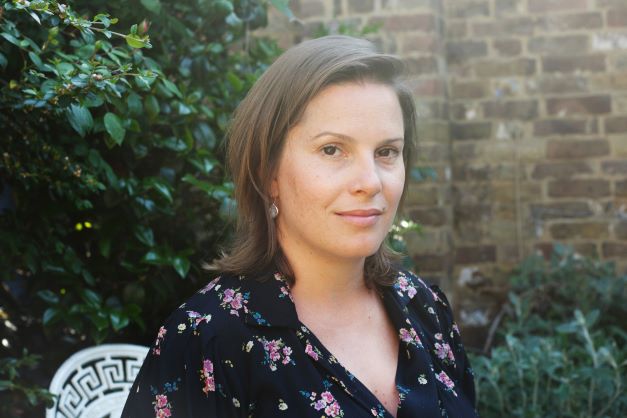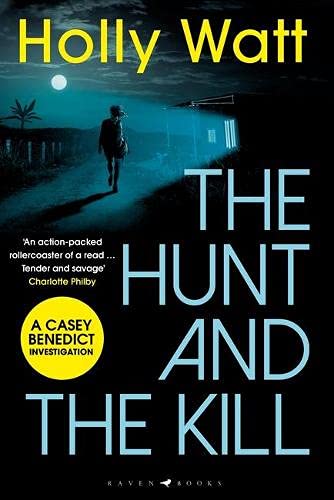Holly Watt, (To The Lions, The Dead Line, and The Hunt and The Kill), explores some of the lessons she's learned after her debut novel became a crime series...

It was one of the best moments of my life. I was sitting in a meeting with an editor from Bloomsbury, and she wanted to buy my first novel, To The Lions. I had dreamed of this moment.
But suddenly, the conversation moved on. The editor wanted to know if there could be a second book based on the same characters. A series, in fact.
‘Of course!’ I heard myself say. ‘No problem!’
Stop talking, I told myself. Stop talking right now. You have no idea how to write a crime series. But it was too late. Somehow I had agreed to write one.
So the next day, I sat down at my laptop.
‘How to,’ I typed nervously into Google, ‘write a crime series.’
It turns out that there are hundreds - possibly thousands - of articles telling you how to write your crime novel. It turns out that there are unhelpfully few on how to write your crime series.
Still. I had a premise. When I first started to write To The Lions, the first in the Casey Benedict series, the idea that it might actually be published seemed completely implausible. Nevertheless, I did have a vague sense that the format of the novels - a journalist investigating a terrible atrocity - might lend itself to a crime series. Realistically, there aren’t that many situations in which someone will repeatedly come across some mysterious crime and then find a way of solving it. There are police procedurals, of course. There are spy novels. But journalism? Maybe.
I wasn’t helped by my approach to writing. It is generally accepted that there are two sorts of writers. Planners and pantsers. I am a pantser, flying by the seat of my pants. I dive into a book and race along, hoping the plot will open up in front of me. Usually, it goes ok. And that’s fine for one book, but it is slightly trickier for writing an entire series.
Despite my pantser approach, the outcome of that first panic-stricken meeting was The Dead Line. The Hunt and The Kill - the third in the Casey Benedict series - will be published on 8 July.
I’m still learning as I go along. Weird things irritate me. One of the characters has a name that I really don’t like anymore and mistype every single time. One member of Casey’s family has a job description that I regret, because it shuts down a plot angle that I really like. Maybe that plot can end up in a standalone one day. Crime writers do have one particularly strong card to play. A certain character just wasn’t working for me anymore. So I killed him.
A useful aspect about writing fiction is that you can change your “world” if you’ve backed yourself into a corner. If the political editor of my fictional newspaper doesn’t fit into a new novel, I can just introduce a new political correspondent and retire the political editor. Personalities can evolve over several books. In fact, given #MeToo and the pandemic, the entire newspaper can be overhauled if I feel like it.
There are certain rules though. Even though they’re part of a series, my editor at Bloomsbury is very clear that each book has to operate as a standalone. The further I get into the series, the harder I am finding it to introduce the main characters in a brief but effective way. How much does the reader need to know about this character for this book? How much do they need to be reminded of their past activities? The main character has brown hair and grey eyes, but do I need to say that again? And does she definitely have brown hair and grey eyes anyway? Hmm, better check. I’ve kept a long “cast list” with a brief description of who’s who to try and avoid continuity problems.
 I also don’t want to ruin the earlier stories for someone who hasn’t read them, so I have to find ways of hinting at them without giving away the outcomes. ‘Remember what happened in Bangladesh,’ a character might say ominously, without spelling out what actually happened in Bangladesh.
I also don’t want to ruin the earlier stories for someone who hasn’t read them, so I have to find ways of hinting at them without giving away the outcomes. ‘Remember what happened in Bangladesh,’ a character might say ominously, without spelling out what actually happened in Bangladesh.
A painful lesson came with The Dead Line, where I had included the baddie from To The Lions in the next book’s conclusion. My editor concluded that a recurring villain just didn’t work so early on in the series, and required too much knowledge of the first book, so the ending had to be rewritten.
I do have a general sense of where the main characters are headed in the next few books. My problem is that it feels hubristic. I am writing the fourth in the series, but I still can’t let myself think very far ahead. The characters are still developing though - and surprising me at times. If I’d had to say goodbye to them after just one book, I would have been sad.
There’s another thing that aspiring writers may wish to note. My brilliant film agent made a spirited attempt to sell the film rights when To The Lions came out. Despite some interest, they didn’t get sold. The moment it became clear that To The Lions was the first in the series, however, there was a lot of interest. The rights were ultimately sold to the producer of Spooks, The Night Manager and The Undoing, which starred Hugh Grant and Nicole Kidman last year. In the era of the boxset, a series seems to be much more saleable than a one-off.
For me, getting the hardback of a new book is a complete thrill, but it is also slightly nerve-racking. Once a book is published, it is set in the literary equivalent of stone and I can’t go back and change anything. But equally, I enjoy the sense that I have fleshed out a bit more of this weird world I have created. And then, I move onto the next novel.
Buy your copy of The Hunt and the Kill
Holly Watt was part of the team who broke the MPs expenses scandal and has also worked on the Panama Papers. She has written for the Sunday Times, the Daily Telegraph and the Guardian. Her debut novel To The Lions, the first in the Casey Benedict series, was the winner of the CWA Ian Fleming Steel Dagger and was a 2019 Thriller of the Year in the Sunday Times, Times and Guardian. @holly_watt
Comments